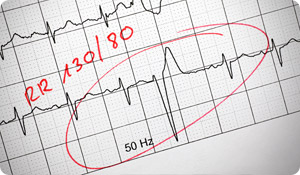
At some time, most people will experience an occasional heart arrhythmia, irregular heartbeats that may feel like a fluttering or a racing heart. Although usually harmless, heart arrhythmias can be troublesome or even life threatening.
Heart arrhythmias occur when there is a change in the normal sequence of electrical impulses in your heart, causing your heart to beat too fast (tachycardia), too slowly (bradycardia), or erratically. When the heart doesn't beat properly, it can't pump blood effectively throughout the body. When there's a shortage of blood to the lungs, brain and other organs in your body, the organs can't work properly and may even shut down or be damaged.
Symptoms of Arrhythmias
In some instances, arrhythmias may not cause any signs or symptoms. In fact, you may not know you have a problem until your doctor detects a heart arrhythmia during a routine physical exam. However, some symptoms are noticeable and in addition to the symptoms mentioned above may also include:
- Chest pain
- Shortness of breath
- Lightheadedness
- Dizziness
- Fainting or near fainting
- Skipping beats-changes in the pattern of your pulse
- Sweating
If you experience any of these symptoms, call your doctor. See your doctor right away if you experience these symptoms suddenly or frequently.
Causes of Arrhythmias
Your risk of heart arrhythmias increases if you have:
- Blood chemistry imbalance
- Cardiomyopathy: a weakening of the heart muscle or a change in the heart muscle
- Heart failure
- Overactive thyroid gland
- Past heart attack
Arrhythmias may also be caused by the following:
- Amphetamines
- Caffeine
- Cocaine
- Beta blockers
If your arrhythmia is serious, you may need urgent treatment to restore a normal heart rhythm, including:
- Electrical "shock" therapy (defibrillation or cardioversion)
- The implantation of a pacemaker to interrupt the arrhythmia when it happens
- Medications called anti-arrhythmic drugs that prevent an arrhythmia from happening or to keep your heart rate from becoming too fast or too slow
Complications from heart arrhythmias may include angina (chest discomfort due to poor blood flow through the blood vessels of the heart muscle), heart attack, heart failure, stroke, or sudden death.
Arrhythmia Prevention
There are steps you can take to reduce your chance of developing a heart arrhythmia, including:
- Eating a well-balanced, low-fat diet
- Exercising regularly (at least 30 minutes a day on most days)
- Quitting smoking
Sources:
"Heart Arrhythmias." Mayo Clinic.
http://www.mayoclinic.com/health/heart-arrhythmias/DS00290
"Arrhythmias." American Heart Association.
http://heart.org/HEARTORG/Conditions/Arrhythmia/Arrhythmia_UCM_002013_SubHomePage.jsp





